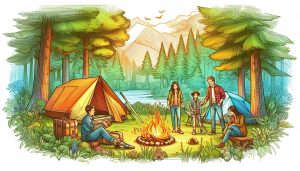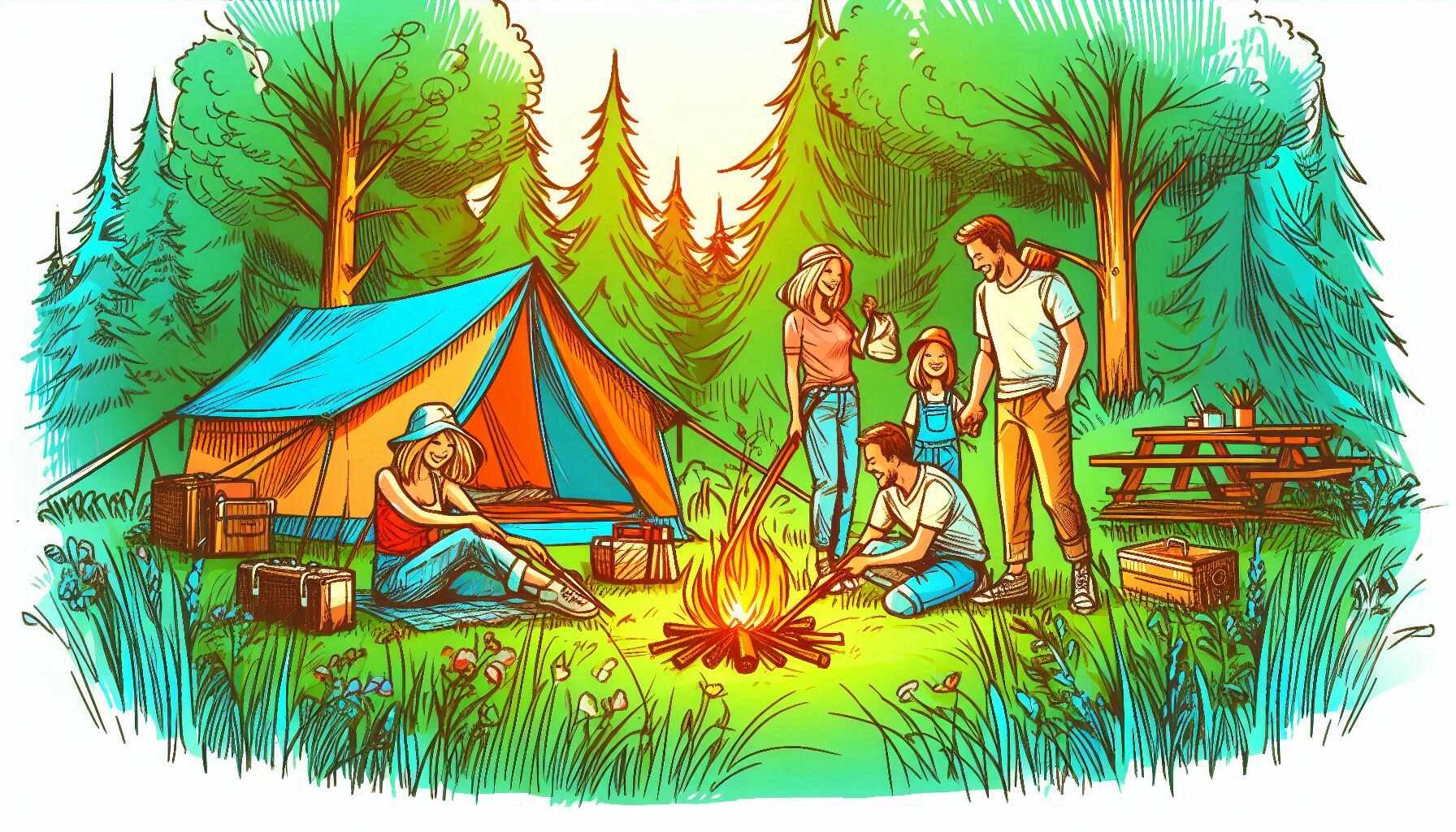[ad_1]
In today’s fast-paced world, where screens often outweigh nature in capturing our attention, planning a family camping adventure can be the perfect escape. Imagine trading backlit gadgets for twinkling stars, campfire sing-alongs replacing binge-watching, and sharing stories around a fire pit while roasting marshmallows. Camping not only gives your family a chance to bond but also revitalizes you all with fresh air and new experiences. So, how do you ensure that your family camping trip is smooth and enjoyable?
This article will outline 10 essential tips to help you plan a camping adventure that’s fun, safe, and accommodating for everyone involved—from toddlers to grandparents. Whether it’s your first time or you’re a seasoned camper, these insights will lead you to create lasting memories without the stress often associated with family outings.
Mastering the Art of Active Listening: A Guide for Modern Parents
Understanding the Basics of Family Camping
Family camping is more than just pitching a tent or sleeping under the stars; it’s about creating a shared experience that fosters connection, teaches valuable life skills, and deepens your family bonds. Camping can take many forms—from car camping at established campgrounds to backpacking off the beaten path. The essential concept to grasp is that planning ahead is key to ensuring a hassle-free and enjoyable experience.
Understanding the different types of camping can also help you choose the right adventure for your family’s needs. For example:
-
- Tent Camping: Traditional camping that allows you to connect with nature but requires certain gear.
-
- RV Camping: Offers more comforts like a kitchen and bathroom, ideal for families with younger kids.
-
- Backpacking: Best for the adventurous spirit, but can be more physically demanding and requires careful preparation.
By recognizing these basics, you can tailor your trip to best fit your family’s preferences.
Key Benefits of Family Camping for Parents and Children

Now that we’ve laid the groundwork, let’s explore some significant advantages of choosing family camping:
-
- Strengthened Family Bonds: Camping gives your family the opportunity to disconnect from daily distractions, encouraging communication and teamwork.
-
- Enhanced Physical Fitness: Engaging in activities like hiking and swimming promotes active living, which is vital for both parents and kids.
-
- Appreciation for Nature: Experiencing the great outdoors fosters respect for the environment and encourages sustainable behaviors in children.
-
- Building Life Skills: From setting up a tent to cooking over a campfire, children learn valuable skills that promote independence and confidence.
-
- Stress Relief: The serene beauty of nature can help reduce stress levels for both parents and kids, leading to improved well-being.
By focusing on these aspects, your family camping adventure can set the stage for essential life lessons while still being incredibly fun.
Navigating the Challenges: The Importance of Co-Parenting Counseling for Divorced Families
Common Challenges with Family Camping and How to Overcome Them
Like any family outing, camping has its challenges, but they can be easily overcome with a bit of foresight. Here are some common issues and how to tackle them:
-
- Kids’ Attention Span: Long hikes or unstructured downtime might lead to restlessness. To combat this, plan short, engaging activities like scavenger hunts or nature photography contests to keep them involved.
-
- Weather Changes: Unpredictable weather can dampen spirits. Always check the forecast beforehand and pack for varying conditions. Having a backup plan such as board games or indoor activities can also save the day.
-
- Packing Pressure: Overpacking can lead to unnecessary stress. Create a packing list tailored to your family’s specific needs, and stick to the essentials—less really can be more!
-
- Safety Concerns: Always prioritize safety. Familiarize yourself with first aid procedures, keep emergency supplies handy, and educate your children about wildlife safety to ensure a secure adventure.
By anticipating these challenges, you can turn potential pitfalls into manageable hurdles.
Expert-Recommended Family Camping Strategies
Here are some actionable tips from seasoned campers to help ensure your family camping adventure is a success:
-
- Choose the Right Campsite: Look for locations that provide family-friendly amenities such as bathrooms, picnic tables, and activity options. Reading reviews from other families can guide your decision.
-
- Involve Everyone in Planning: Get your entire family’s input on destination, activities, and meals. This makes everyone feel included and excited.
-
- Create a Meal Plan: Spending time cooking can eat into playtime. Plan simple, tasty meals in advance and prep as much as you can at home. Think foil packet dinners or make-ahead breakfast burritos!
-
- Pack Smart: Don’t let gear clutter your space. Pack using separate bins for different categories—cooking supplies, personal items, and games—making everything easy to access.
-
- Set Up Camp Together: Turn setting up tents and areas into a fun game. Bonding over tasks can reduce the feeling of chore-like work.
-
- Embrace Technology Wisely: Use apps to locate nearby hiking trails, weather updates, and even stars at night. These can be handy without detracting from the experience of being in nature.
Essential Family Camping Tips for Different Age Groups
Understanding that kids have different needs at various developmental stages can help tailor your camping experience:
-
- Toddlers (Ages 1-3): Focus on safety. Bring a portable crib or playpen and keep a close watch. Set up a “home base” within the campsite where they feel comfortable and secure.
-
- Preschoolers (Ages 4-5): Engage them with nature-themed activities—like collecting leaves or identifying wildlife. They will love personalized scavenger hunts!
-
- School-Aged Kids (Ages 6-12): Encourage independence by allowing them to help set up tents or cook. Teaching them about camping skills like tying knots can also be exciting.
-
- Teenagers (Ages 13+): Provide them with some autonomy by letting them choose the activities or even set up their own tent. Engaging them with more challenging hikes or outdoor adventures might pique their interest.
By considering your children’s ages, you can create an adventure that is both engaging and age-appropriate.
Making Family Camping Work for Your Family
Every family is unique, and your camping trip should reflect that. Consider adapting the following strategies to meet your family’s specific needs:
-
- Cultural Customization: If your family enjoys certain foods or activities, bring those into your camping experience. Whether it’s a favorite dish to cook over the fire or games you traditionally play, blending your family’s culture into the trip makes it special.
-
- Flexibility: Life can be unpredictable, especially with kids. Be open to changing plans if something isn’t working. Sometimes the best memories come from unexpected moments!
-
- Alternate Accommodations: If roughing it isn’t your style, consider glamping (glamorous camping) options. Yurts, cabins, or RV rentals can offer a bridge between comfort and nature.
When to Seek Professional Help with Family Camping
While camping can often be a family bonding experience, there may be times it reveals deeper issues or challenges that go beyond fun in the outdoors. Consider seeking professional advice if:
-
- Behavioral Issues Arise: Persistent issues such as severe anxiety related to nature or other children may warrant attention.
-
- Physical Limitations: If a family member has health concerns that make camping difficult, it’s wise to consult a health professional before planning a trip.
-
- Conflict Resolution: If family dynamics become challenging during outings, addressing those issues with a family therapist can help.
Remember, reaching out isn’t a sign of weakness but rather a step toward strengthening your family unit.
Final Thoughts on Planning Your Family Camping Adventure
Planning a family camping adventure can be a rewarding endeavor, encouraging creativity, teamwork, and a love for nature. By following these 10 essential tips, you are setting the stage for a successful trip that all family members can enjoy.
Remember to prepare adequately, communicate openly, and embrace the unpredictable nature of outdoor adventures. Ready to take the plunge into the great outdoors? Start planning your family’s unforgettable camping journey today! Happy camping!
For more tips and inspiration about family bonding and outdoor adventures, feel free to explore our resource library. Your next family adventure awaits!
[ad_2]


